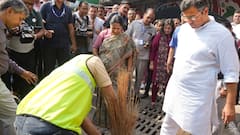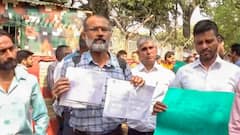Delhi CM Kejriwal Tables Trust Vote Motion In Assembly, Discussion Scheduled For Tomorrow
This decision follows recent allegations made by Kejriwal, accusing the BJP of attempting to lure AAP MLAs and destabilize his government.

Delhi Chief Minister Arvind Kejriwal moved a Motion of Confidence in the Delhi Assembly on Friday. The discussions were scheduled for the following day, Saturday, as the House adjourned its proceedings.
In the Assembly, Kejriwal said, "We can see that parties are being broken & governments are being toppled in other states by slapping false cases. In Delhi, they intend to arrest AAP leaders under the pretext of a liquor policy case. They want to topple the Delhi Government because they know that they can never win the election in Delhi. To show the people that none of our MLAs broke away and all of them are intact, I present a Confidence Motion."
This decision follows recent allegations made by Kejriwal, accusing the BJP of attempting to lure AAP MLAs and destabilize his government.
"I will present the vote of confidence in the Delhi Assembly today," stated Kejriwal in a post on X in Hindi. However, the specific reasons behind this move were not detailed in his post.
विधानसभा में आज मैं विश्वास मत रखूँगा।
— Arvind Kejriwal (@ArvindKejriwal) February 16, 2024
Further commenting on the alleged Delhi excise policy scam, Kejriwal said, "This so-called liquor scam is not a scam at all. They (BJP) do not want to carry out an (fair) investigation. All the AAP leaders have been arrested under the guise of this scam. Their only aim is to topple the Delhi government by one means or another".
VIDEO | Here’s what Delhi CM Arvind Kejriwal (@ArvindKejriwal) said on the alleged Delhi excise policy scam, while speaking in the Assembly earlier today.
— Press Trust of India (@PTI_News) February 16, 2024
“This so-called liquor scam is not a scam at all. They (BJP) do not want to carry out an (fair) investigation. All the AAP… pic.twitter.com/6Ttkgv3nOr
What Is A Floor Test?
A floor test, commonly known as a 'trust vote,' is a procedure conducted in legislative bodies to determine whether a government suspected of losing majority support still holds the confidence of the House. This is accomplished through a vote of the members.
When the government's majority is questioned, the leader of the party claiming to have majority support must initiate a vote of confidence and demonstrate the majority among those present and voting.
The Chief Minister presents a motion seeking a vote of confidence, and the Members of the Legislative Assembly (MLAs) present in the House cast their votes. If the majority of members vote in favor, the government retains power; if the Chief Minister loses the vote, the government must resign.
This process is applicable in both Parliament and state Legislative Assemblies. Voting can be conducted through a voice vote, where MLAs respond verbally to the motion. Electronic voting involves casting votes by pressing a button, displaying the numbers for each side on a board. In a physical division of votes, lawmakers cast votes in a ballot box, which are then counted.
Additionally, in situations where there are internal disputes within a coalition government, the Governor may instruct the Chief Minister to prove majority in the house.
There is another type of test known as the Composite Floor Test, conducted when more than one person stakes a claim to form the government. In cases where the majority is unclear, the governor might call for a special session to determine who holds the majority. The count is based on those present and voting, either through a voice vote or division voting. In a division vote, electronic gadgets, ballots, or slips are used, and the person with the majority forms the government. In the event of a tie, the speaker may cast the deciding vote.






































